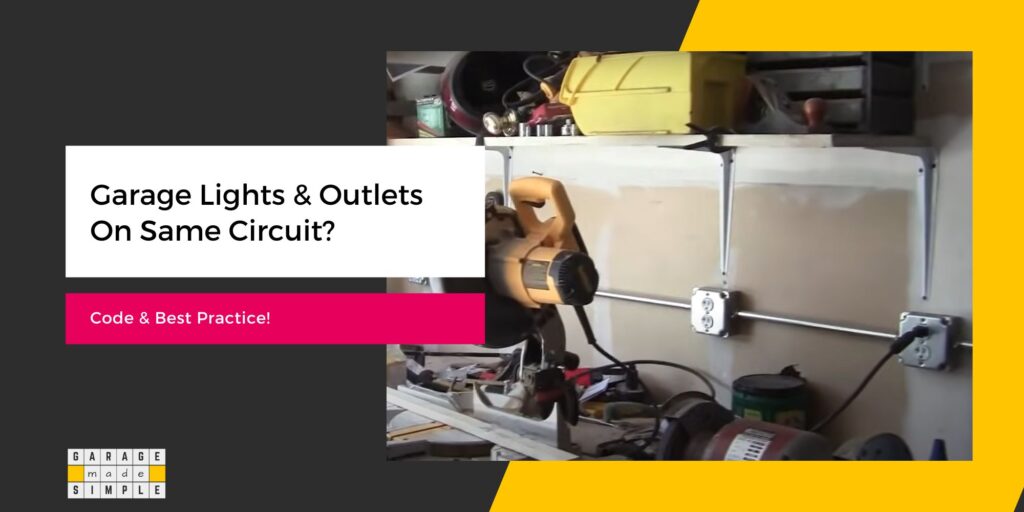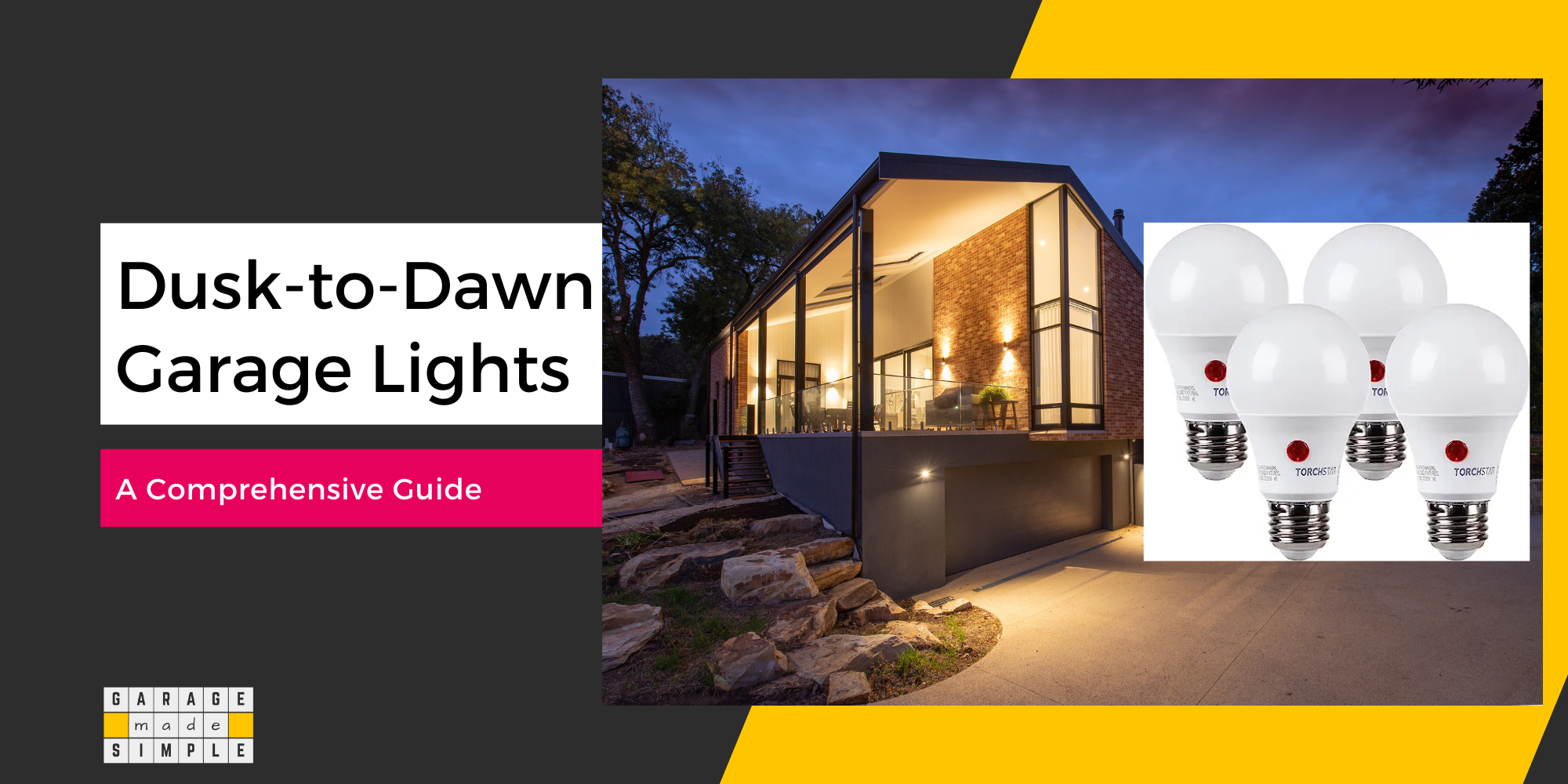Garage Lights & Outlets On Same Circuit? (Code & Best Practice!)
As an Amazon Associate, I earn from qualifying purchases.
Can Garage Lights and Outlets Be on the Same Circuit?
Is your new garage ready for wiring? Are you considering adding more garage lights and outlets in an existing garage? Whatever the reason, a commonly asked question is can garage lights and outlets be on the same circuit?
The code permits having garage lights and outlets on the same circuit. However, many professional electricians recommend that garage lights and outlets should be on separate circuits.
Having the garage lights and receptacles on the same circuit has several disadvantages.
In this post I shall explain the disadvantages of putting garage lights and outlets on the same circuit. I shall also discuss a few situations where having garage lights and outlets on the same circuit makes sense.
NOTE: The terms “outlets” and “receptacles” can be used interchangeably. In this post I have mostly used the term “outlets”. Read it as “receptacles” if you wish.
Another name for a receptacle is an electrical outlet. Electrical outlets or receptacles are often called plugs or plug-ins, but a plug is the proper term for the male cord end (that plugs into an outlet or a receptacle).
ELECTRICAL-ONLINE

WARNING: Electrical wiring work can be extremely dangerous and it is best to let a professional electrician do it. You can do it yourself if you have some experience and adhere to the safety precautions listed below.
What Is the Safest Way to Handle Electrical Wires?
“Treat all electrical wiring, even “de-energized” ones as if it is live, unless it has been locked out and tagged”
While using the services of a professional electrician are highly recommended, you may do some electrical work, such as installing a subpanel in a detached garage, provided you follow the basic safety guidelines, as under:
- Use protective eyewear, especially when drilling or grinding metal
- Wear insulated rubber gloves when working on any circuit or branch circuit
- Always use insulated tools while working with electricity
- De-energize the electrical wires on which you will be working. Tag the circuit breaker to prevent someone from switching it on accidently
- Electrical wiring in wet or damp locations or underground must be within a PVC conduit
- Underground wiring conduits should be at least 18 inches below grade as per code
- All receptacles for equipment that could be in wet or damp locations should be equipped with Ground Fault Circuit Interrupter (GFCI)
- Never use old frayed cables, damaged insulation or broken plugs
- High voltage equipment should be properly grounded to insure electricity flows directly to the ground and not through the person in contact with the live wire
Disadvantages of Lights and Outlets on the Same Circuit
Putting garage lights and outlets on the same circuit may not always be the best choice. The disadvantages are:
Local Code Restrictions
The 2020 National Electric Code (NEC) is applicable to all states of the US. Individual states are in the process of upgrading to the latest version but they are in different stages of the journey.
Local code adopted by the local authorities follow the guidelines set by the NEC. However, they can and sometimes do adopt a stricter interpretation of the NEC code.
As a result the local code can prohibit contractors from putting lights and outlets on the same circuit.
You cannot install garage lights and outlets on the same circuit, if the local code prohibits it. Non compliance with the local code would be against the law.
Practical Considerations
The lord on an outlet is not predetermined. It really depends on the appliance that is plugged in. In case the said appliance has a higher than planned load requirement, the breaker in the subpanel will trip.
When the garage lights and outlets are on the same circuit, the lights will go off too! This can be pretty inconvenient at night, unless you have an alternate light source.
Cost Implication
Believe it or not, installing garage lights and outlets on the same circuit can sometimes be more expensive than installing them on separate circuits.
Typically garage lights, especially LED lights, have fairly low power consumption. Thinner and cheaper wires can be used on a “lights only” branch circuit.
You can not use thinner and cheaper wires for outlets, though. Appliances such as heaters or air conditioners and power tools such as table saws and drills consume a lot more power.
By having the garage lights and outlets on the same circuit you must use the thicker and costlier wires (meant for outlets) for the lights as well. This often increases the overall garage wiring cost.
Future Outlet Replacement can be Tricky
If the garage lights and outlets are on the same circuit then the repair or replacement of the outlet can be tricky. The outlet connections may have become loose or the outlet cover plate may have cracked because something hard hit it.
Quite obviously you have to switch off the electricity to the circuit for repair or replacement. The lights go off too! This problem is similar to that of the breaker tripping. The only difference is that in most cases you can plan the work and schedule it for daytime.
Advantages of Lights and Outlets on the Same Circuit
There are a few occasions when having some of the garage lights and outlets on the same circuit makes sense.
Outlet Used for Low Wattage Appliances
You may have a section of your garage that is dedicated to a home office or recreation. The outlets in this section are probably used for low wattage appliances such as a TV or a computer.
You can have the lights and the outlets in this section of the garage on the same circuit. Just make sure that you never plug in high wattage appliances such as a heater into these outlets.
Lights and Outlets Close to Each Other
There are some areas of your garage that may have lights and outlets quite close to each other. An example is your garage workshop bench. The lights above the workbench and the outlets for power tools such as drills or saws can be on the same circuit.
Of course make sure to use wires that are thick enough to handle the load of the highest rated power tool and then some!
Running some garage lights and outlets on a single circuit will most likely be cheaper than running separate circuits for lights and outlets.
Moreover, there should be lights on another circuit too. Do switch those on when you are doing something on the workbench. You do not want to be caught in the dark should one of your power tools cause the breaker to trip!
Bottom Line
The bottom line is that:
- The 2020 NEC code permits you to have garage lights and outlets on the same circuit
- However, your local code “may” prohibit it. By law you must comply with the local code
- Generally speaking, having garage lights and outlets on the separate circuit is more beneficial
- Of course, there can be exceptions
Thank you very much for reading the post. I do hope you found it informative and useful.






